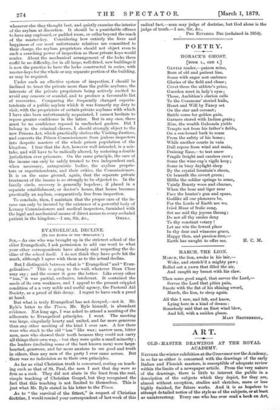EVANGELICAL DECLINE.
(To THE EDITOR OF 711E "SPECTATOR.")
Sin,—As one who was brought up in the strictest school of the older Evangelicals, I ask permission to add one word to what your other correspondents have already said respecting the de- cline of the school itself. I do not think they have quite hit the mark, although I agree with them as to the actual decline.
But I distinguish between what is "Evangelical" and " Evan- gelicalism." This is going to the wall, whatever Dean Close may say; and the sooner it goes the better. Like every other "lam," it was partial, exclusive, intolerant. It contained the seeds of its own weakness, and I appeal to the present crippled condition of a a very noble and useful agency, the Pastoral Aid Society, as a proof of this decay. I regret to have such a proof at hand.
But what is truly Evangelical has not decayed,—not it. Mr. Ryle's letter to the Times, Mr. Ryle himself, is abundant evidence. Not long ago, I was asked to attend a meeting of the adherents to Evangelical principles. I went. The meeting was large, singularly hearty and united, and far more generous than any other meeting of the kind I ever saw. A few there were who stuck to the old " ism " like wax; narrow men, bitter men, men who showed their teeth because they could not carry all things their own way,—but they were quite a small minority ; the leaders (including some of the best known men) were large- hearted, generous, and far more anxious to see good and truth in others, than any men of the party I ever came across. But there was no indecision as to their own principles.
As far as vital Christian truth is concerned, resting on teach- ing such as that of St Paul, the men I met that day were as firm as a rock. They did not abate in the least from the real, simple teaching of Christian Gospel, but they recognised the fact that this teaching is not limited to themselves. This is just what Mr. Ryle stated in his letter to the Times.
As to "the survival of the fittest," in respect of Christian doctrine, I would remind your correspondent of last week of this
radical fact,—man may judge of doctrine, but God alone is the judge of truth.—I am, Sir, Sm.,
PRO ECCLESIA DES (ordained in 1854).


































 Previous page
Previous page